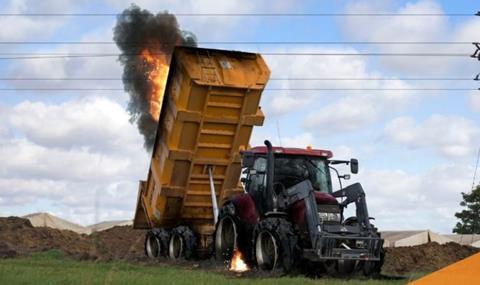
Nearly half of all overhead power line incidents last year were caused by haulage firms, according to UK Power Networks (UKPN).
The energy firm has now launched a campaign to remind people working near power lines to concentrate on their safety and plan properly.
It said the four groups with the highest number of safety incidents during the past five years have been road hauliers, farmers, tree surgeons and builders.
But hauliers have by far the most number, with 44% of overhead line incidents in 2020 attributed to transport firms.
The ‘Think, Plan, Locate’ initiative will see UKPN working with the RHA and the National Farmers’ Union to raise awareness of working safely around power lines.
Touching high voltage cables can be fatal. Accidental contact with live overhead power lines kills people and causes many serious injuries every year.
Read more
- Mick George has power lines fine reduced on appeal
- Construction haulier Mick George fined more than £565,000 after tipper comes into contact with overhead power lines
People are also harmed when a person or object gets too close to a line and a flashover occurs.
Ros Forbes, UKPN safety advisor, said: “Safety is our number one priority and we saw a rise in incidents when locked down eased last summer, so it’s timely to remind people again of the dangers.
“Our research has shown us the trades and professions most in danger and we sense that a focus on being Covid-secure has led to less of an emphasis on electrical safety in some areas.”
Pete Short, head of business development for the RHA said: “You can never be too careful when it comes to working near power lines, as one momentary lapse or wrong move can be fatal.
“We urge firms to make sure their drivers and other staff are aware of the risks of working in and around electricity networks so they can do everything they can to keep themselves and others safe every time.”
In 2018, construction haulier Mick George was fined more than £565,000 after a tipper vehicle driven by one of its employees came into contact with overhead power lines.
This was later reduced to £334,000 on appeal.













